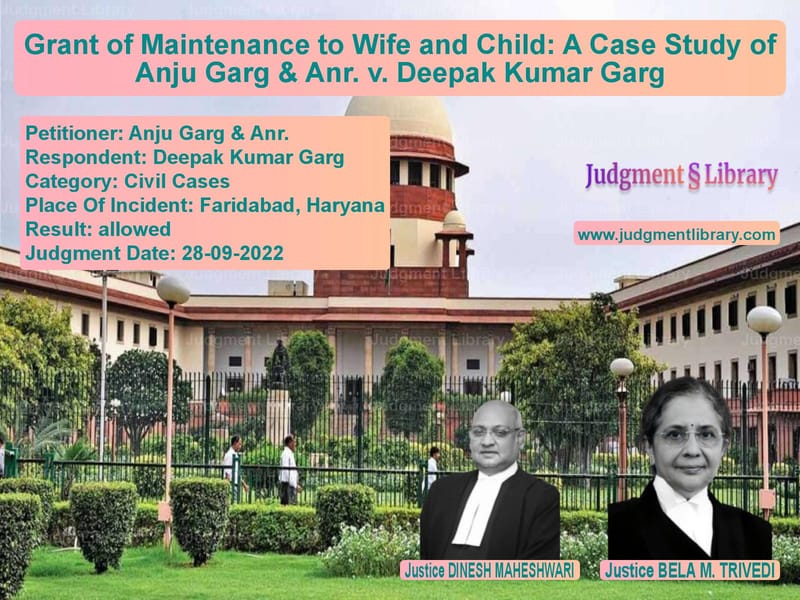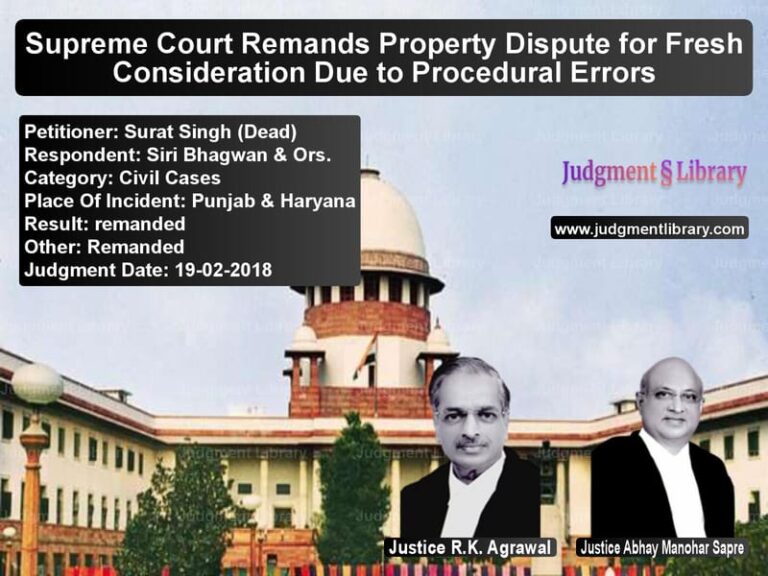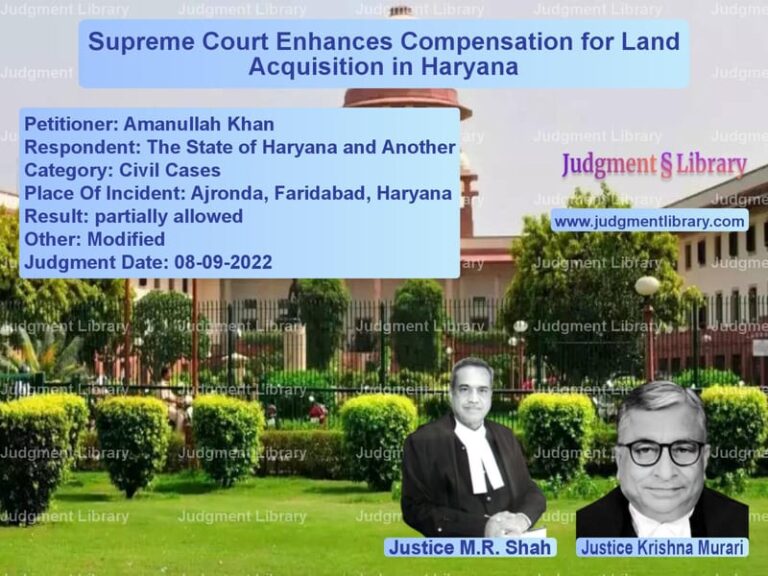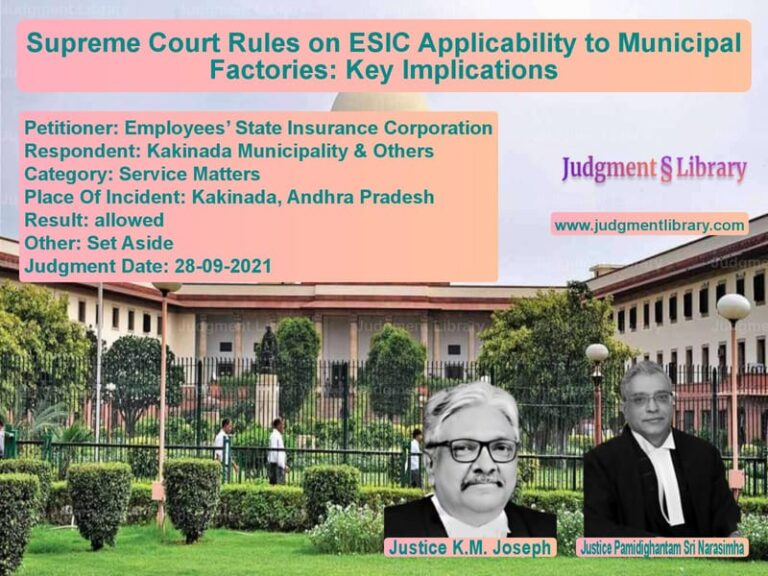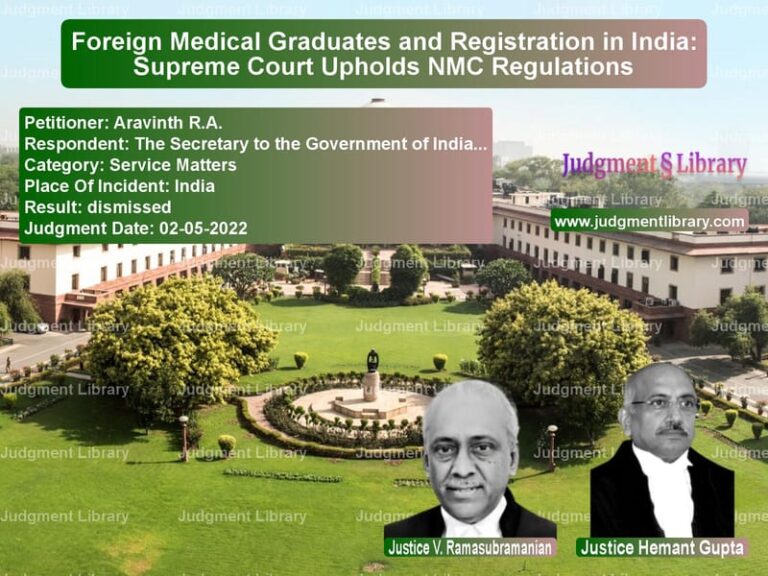Grant of Maintenance to Wife and Child: A Case Study of Anju Garg & Anr. v. Deepak Kumar Garg
The present appeal arises from the dismissal of a maintenance petition filed by Anju Garg (appellant 1) and her children (appellant 2 and 3) against Deepak Kumar Garg (respondent). The appeal is directed against the judgment and order dated 10th September 2018 by the High Court of Punjab and Haryana, which dismissed the revision application challenging the Family Court’s order of 9th December 2016. The Family Court had granted maintenance to the minor son of the appellants, but denied maintenance to the wife, Anju Garg, on the grounds that she had left her matrimonial home without justifiable reasons. The appellants’ case revolves around the need for maintenance under Section 125 of the Cr.P.C. for the wife and children, while the respondent has raised various objections to the maintenance claim.
Petitioner’s Argument
The petitioners, represented by their counsel, argued that the Family Court erred in denying maintenance to the wife, Anju Garg, who had left her matrimonial home due to repeated harassment and cruelty by the respondent. The petitioners contended that despite the wife’s efforts to reconcile, the respondent’s conduct, including the demand for dowry, was intolerable. They also alleged that the respondent was involved in financial disputes and had failed to maintain the appellants. Furthermore, the petitioners highlighted that the respondent’s claim that the son was not his biological child was baseless and that a DNA test application filed by the respondent had been rightly dismissed by the Family Court. They emphasized that the wife and children were unable to maintain themselves, and hence, they were entitled to maintenance under Section 125 Cr.P.C.
Read also: https://judgmentlibrary.com/fair-price-shop-license-dispute-a-legal-analysis-of-the-ram-kumar-case/
In addition, the petitioners argued that the High Court’s dismissal of the revision application was too perfunctory and failed to adequately consider the evidence presented by the appellants, including the testimony of Anju Garg regarding the respondent’s cruelty. They contended that the Family Court’s decision to deny maintenance to the wife was unjust, as the respondent was an able-bodied man capable of providing for his family.
Respondent’s Argument
The respondent, represented by his counsel, countered the claims by asserting that the appellant-wife had left the matrimonial home without any justifiable reasons. The respondent claimed that the allegations of cruelty and harassment were false and that the wife had voluntarily chosen to leave. He further disputed the claim that the son, Rachit Garg, was his biological child, alleging that the appellant was unfaithful and that the son was not his. The respondent argued that he had no stable source of income as his party business had closed, and therefore he was unable to provide for the wife or the children. He contended that the Family Court’s decision to grant maintenance to the son but not to the wife was justified, given the wife’s departure from the matrimonial home.
Furthermore, the respondent raised concerns about the credibility of the appellant’s version and submitted that the Family Court had correctly dismissed the maintenance petition for the wife. He argued that the appellant’s allegations of dowry demands and harassment were not substantiated by any evidence.
Court’s Analysis and Ruling
The Supreme Court, after hearing the arguments, carefully considered the legal provisions under Section 125 of the Cr.P.C., which aims to prevent vagrancy and destitution, ensuring that wives and children are provided for when they are unable to maintain themselves. The Court noted that the primary purpose of the provision is to provide a speedy remedy for wives and children who are in distress, and that the obligation of the husband to maintain his wife and children is a social and legal duty, which cannot be ignored without justifiable grounds.
The Court found that the Family Court had erred in dismissing the maintenance petition filed by the wife, Anju Garg, particularly in light of the testimony and evidence presented. The evidence showed that the appellant-wife had been subjected to repeated harassment and cruelty, and that she had no means of supporting herself after leaving the matrimonial home. The Court also found that the respondent’s failure to maintain his family, despite his ability to do so, was a violation of his legal obligation. The Court emphasized that the respondent, being an able-bodied man, had a moral and legal duty to maintain his wife and children.
Regarding the respondent’s allegation that the son was not his biological child, the Court found no substantiating evidence for this claim. The DNA test application filed by the respondent was dismissed by the Family Court, and the Court held that the respondent’s baseless allegations of infidelity were irrelevant to the issue of maintenance. The appellant-wife had already provided sufficient evidence to establish the need for maintenance for herself and her children.
The Court further noted that while the Family Court had granted maintenance to the son, Rachit Garg, it had unjustifiably denied maintenance to the wife, Anju Garg. The Court held that the wife, as a destitute person, was equally entitled to maintenance. The Court, therefore, decided to enhance the maintenance allowance for the appellant-wife to Rs. 10,000 per month, in addition to the Rs. 6,000 per month granted to the son. The Court directed that the respondent pay the entire arrears of maintenance within eight weeks from the date of the judgment, after adjusting any amount already paid.
Conclusion
This case underscores the legal obligation of a husband to provide for his wife and children under Section 125 of the Cr.P.C., which is designed to prevent destitution and vagrancy. The Supreme Court’s ruling emphasizes that the Family Court must carefully consider the evidence presented in maintenance cases and cannot dismiss claims without justifiable reasons. The Court’s decision to grant maintenance to the wife and child reflects a commitment to ensuring that the social and legal rights of women and children are upheld, particularly in cases where the husband fails to fulfill his duties. This judgment reinforces the principle that maintenance proceedings are not just a matter of financial support but also a means of ensuring dignity and security for vulnerable individuals.
Petitioner Name: Anju Garg & Anr..Respondent Name: Deepak Kumar Garg.Judgment By: Justice DINESH MAHESHWARI, Justice BELA M. TRIVEDI.Place Of Incident: Faridabad, Haryana.Judgment Date: 28-09-2022.
Don’t miss out on the full details! Download the complete judgment in PDF format below and gain valuable insights instantly!
Download Judgment: anju-garg-&-anr.-vs-deepak-kumar-garg-supreme-court-of-india-judgment-dated-28-09-2022.pdf
Directly Download Judgment: Directly download this Judgment
See all petitions in Contract Disputes
See all petitions in Property Disputes
See all petitions in Damages and Compensation
See all petitions in Judgment by Dinesh Maheshwari
See all petitions in Judgment by Bela M. Trivedi
See all petitions in allowed
See all petitions in supreme court of India judgments September 2022
See all petitions in 2022 judgments
See all posts in Civil Cases Category
See all allowed petitions in Civil Cases Category
See all Dismissed petitions in Civil Cases Category
See all partially allowed petitions in Civil Cases Category

